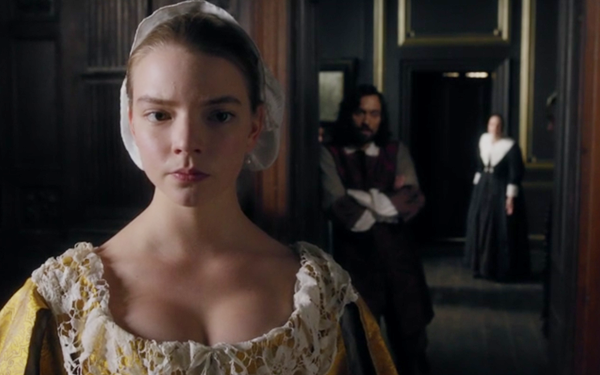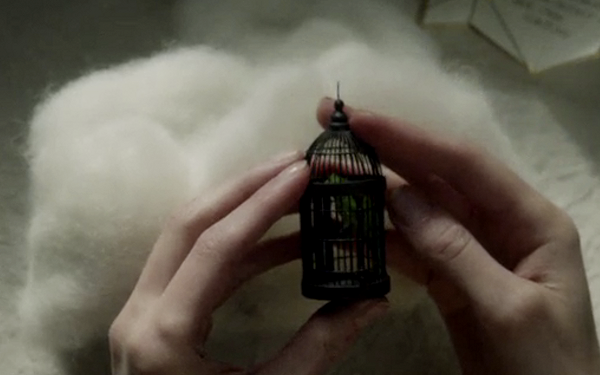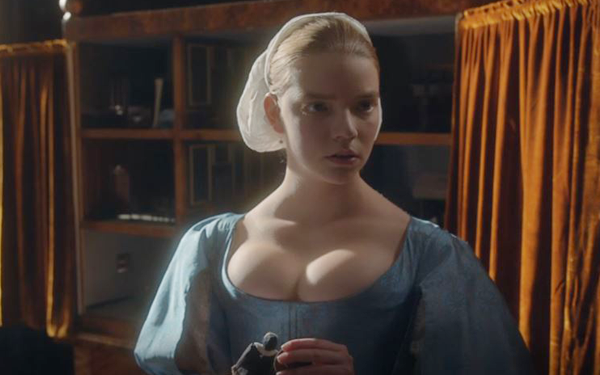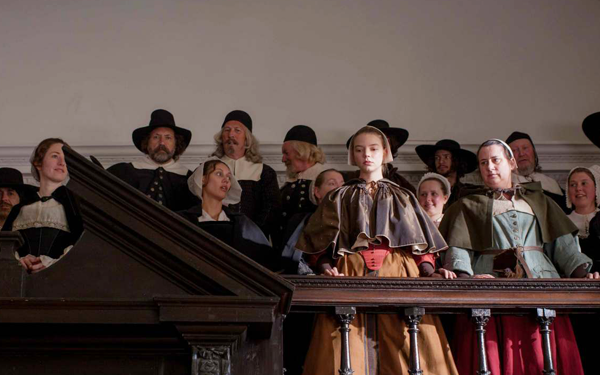
The Miniaturist is a mini series adaptation of a novel by Jessie Burton. It narrates the story of a woman who becomes the wife of a prominent merchant, only to be engulfed in the household's secrets when she begins to receive miniature items that is telling of her situation. The whole adaptation runs for 2.5 hours, and while a lengthly runtime it would best to watch the whole series in one sitting due to the division of parts. I haven't read the source novel, but for what it was, I thought that it was well done. (note: spoilers)
The show immediately thrusts the audience to peruse at the conflict that might be presented. It starts with the arrival of Petronella ("Nella") in Amsterdam, having been married to Johannes Brandt, a prominent merchant who was quite busy with his endeavors. She was met by the current head of the household, Marin, and the household staff Otto and Cornelia. From the moment Nella meets the people at the house, the atmosphere has been shifty. The staff has been on edge, and Johannes wasn't home to meet her, but she kept to herself. She was subjected to hostility by Marin, with the woman having a stern attitude towards her. It begins to get stranger when Nella witnesses a lingering hug between brother and sister, and that conversation would cease when she entered a room. When she does finally see Johannes, he was aloof towards her. The first half hour of the episode introduces other key players, Jack Philips who was Johannes' errand boy, and Franz and Agnes Meermans, the couple Johannes was doing business for.
The strangeness of her environment gets heightened when Johannes gifts her a cabinet that contains a miniature version of a house. When she was given a guide, she orders a few pieces - a lute, some marzipan (sugar was not allowed at home), and a cage for a parakeet (she wasn't allowed to keep her bird with her). However, she was gifted other things, but the one that has surprised her was when she was given a chair that looked exactly like the one she was sitting on. She had written to the miniaturist that she would no longer acquire of his services, but parcels kept on getting delivered to her home. There were dolls of the residents of the house, a chest with a secret compartment for keys, a crib, and other miniature items. What was scaring Nella was that the items that arrive for her seemed to be foretelling of the future, or showing a predicament that she would encounter later on.

The secrecy of the home eventually collapsed on Nella when she discovers that her husband is gay and has relations with Jack Philips. The walls began going down: Marin used to be with Franz Meermans. The relationship has turned sour when he disapproved of them getting married. The business dealings he has with the Meermans has been a source of stress for both siblings. Nella eventually finds out that the reason why her husband has been leading the Meermans in circles is because he knew they would take him down; Franz hates Johannes, Agnes despises Marin, and once they had their fortune they would be able to do everything. The first part of the series ends with Johannes getting arrested for sodomy (Johannes' lover and Franz has plotted to take him down for revenge), with Marin dropping another bomb on Nella - she's pregnant.
The second part of the series handles the aftermath of the secrecy - Johannes' trial, and Marin giving birth. Due to the extremely strict ruling of their area, everything Nella was doing has to be in the vein of secrecy - trying to buy Franz's silence by selling the sugar, seeing her husband in jail, handling Marin's pregnancy and labor. On top of that, she was keen to find out who the miniaturist was, and how the person was able to tell the story of the household without any of them talking about it.
In two of the scenes that Johannes and Nella have shared, he points out that they are more alike that they think, and that Nella is needed in the household (and family) more than she thinks she does. In a way, that is true. Both of them have a wider perspective when it comes to tackling problems, and it shows with how Nella takes the reigns in the second part of the series. The story shows how different Nella is from the rest of them through her clothing. Everyone around her wore bleak or muted colors, but Nella was almost always dressed in colorful outfits. When the house was in pandemonium, Nella took the lead in managing their affairs, even if it meant flitting in uncertain areas (the business) just to help her husband. She was strong throughout, and her support for her husband unwavering until the end.

In stories where circumstances like this are the main plot line, the character would usually take a different path - bitter, resentful, unhinged. However, this painted Nella in a different light. With every detail she took in during the four months of marriage, it would have been enough for someone to flee, especially in a society where social and economic standing is key. When Johannes was charged, the family fell from social graces - Nella even had to bribe the church to have Marin buried there. She was a person who didn't care for any of those things. She had accepted her situation in a way that isn't due to the money or the economic standing that Johannes provided, but rather because she has grown fond of him. Her personal circumstances should be enough to make her stay, but she was given the option to have the marriage annulled and still have more than enough to pay off her family's debts, but she chose to stay after listening to his reasons. She has started to care for the people around her, and call the house her home.
It takes a fresh, bright actress to pull off the characteristics of Nella and Anya Taylor-Joy has given the character her due. She, along with Romola Garai (Marin) gave the strongest performances from the group. It helps that both characters are extremely different from each other. Both actresses were able to show that there was more to their character that meets the eye. In Taylor-Joy's case, despite that her character looks innocent and shows naivete at times, she is quicker on her feet than much people give her credit for. As for Garai, she was able to show the vulnerability of her character given the imposing nature. I was a bit iffy with Alex Hassell (Johannes)'s performance, as he seemed that he wasn't into the character at the start. However, that changed especially during the second part of the series. He got into character the moment he stopped being Johannes the merchant, and became Johannes the man. Hayley Squires (Cornelia) and Paapa Essiedu (Otto) were good supporting actors. My least favorite performances came from Ziggy Heath (Jack), Geoffrey Streatfeild (Franz) and Aislin McGuckin (Agnes). I think the character of Jack was supposed to be skittish but his performance was weak in all his scenes. I expected more from Streatfeild since his character has strong relations with the Brandts, but he kind of just threw the towel in his performance. McGuckin wasn't given much to work, but she can disappear from the adaptation and never really know she was there.
The production was good. There were shots that I really liked, and showed a lot of emotion. The miniature pieces were good. My only problem would have to be Anya Taylor-Joy's costumes. While her costume plays an important part in shedding her difference with the rest of the characters, she always seemed like she was dressed in polyester or those thick material curtains are made of. The designs and colors are great, but it somehow highlighted the fabric used on her. It's a small issue and doesn't affect the outcome of the series in any way, but it was just that she seemed to be weighed down by her costume while everyone else was not.

While this wasn't a sweeping adaptation, this was a solid one. I think it was a good call that they trimmed this to 2 episodes rather than 3, as the narrative's flow was just enough to capture the characters and their plight without overextending or stretching the narration.

This sounds like something I'd watch, and I've never heard of it until now. Thank you for posting about it!
ReplyDelete